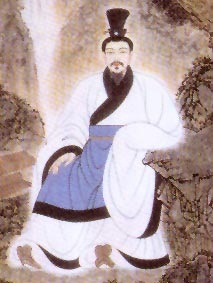Ch'in Chia
Ch'in Chia | |
|---|---|
 | |
| Born | 1st century B.C. |
| Died | 1st century A.D. |
| Occupation | Poet |
| Nationality | Chinese |
| Period | Eastern Han dynasty |
Ch'in Chia (Chinese: 秦嘉; courtesy name: Shih-hui),[1] also known as Qin Jia (c. first century B.C. – first century A.D.),[2] was a Chinese poet of the Eastern Han dynasty.
Name
[edit]The word "Ch'in Chia" means all relations who bear a different family name.[3]
Life
[edit]Ch'in Chia came from Lunghsi.[1] He lived during the Eastern Han dynasty,[4] and was a civil servant.[5]
Separation from his wife
[edit]He was married to Hsu Shu,[6] who was also a poet. They had a very harmonious relationship.[4]
When Ch'in Chia was promoted to the post of commandery supervisor at the capital (Luoyang),[7] and summoned to take up an appointment there, his wife fell ill and had to stay at home with her parents.[2][1] He was therefore unable to say goodbye to her personally,[8] and sent her a series of three poems instead, entitled "Poems for My Wife".[9]
Hsu Shu, in her turn, responded by sending him poems of her own,[10] maintaining a loving correspondence, of which the following is a sample:
Alas! I wish I were your shadow and
Never to be separated from your dear self.
I still hope you will enjoy the capital
And do not feel too unhappy for my sake.[13]
Poetry
[edit]Ch'in Chia's first poem to his wife expresses his sorrow at their separation, and longing for reunion:
Mindful that I had soon to leave on service,
Farther and farther away from you every day,
I sent a carriage to bring you back;
But it went empty, and empty it returned.
I read your letter with feelings of distress;
At meals I cannot eat;
And I sit alone in this desolate chamber.
Who is there to solace and encourage me?
Through the long nights I cannot sleep,
And solitary I lie prostrate on my pillow, tossing and turning.
Sorrow comes as in a circle
And cannot be rolled up like a mat.[11]
Legacy and influence
[edit]A 1968 edition of China Today explains that "Ch'in Chia and his wife Hsui Shu are supposed to be a couple of constant and profound lovers and therefore have often been referred to as such in subsequent ages by people when they laud wedded bliss."[14]
Anne Birrell, in Games Poets Play, stated: "Ch'in Chia's expression of helpless melancholy and graceful, gallant compliments influenced the development of poems on conjugal love."[15]
References
[edit]- ^ a b c Anne Birrell Chinese Love Poetry: New Songs from a Jade Terrace (1995), p. 54
- ^ a b Arthur Waley Translations from the Chinese (1941), p. 55
- ^ Guido Vitale (barone.), Chinese folklore: Pekinese rhymes (1972), p. 54
- ^ a b Harriet T. Zurndorfer Chinese Women in the Imperial Past: New Perspectives (1999), p. 328
- ^ Chambers dictionary of quotations (1997), p. 248. Very little is known of his life.
- ^ Also spelt "Hs'u Shu" and "Xu Shu".
- ^ Per Anne Birrell Games poets play: readings in medieval Chinese poetry (2004), p. 240; Some sources state that the city was Beijing.
- ^ The book Sunflower splendor: three thousand years of Chinese poetry (1975), by Wu-chi Liu and Irving Yucheng Lo, gives a contradictory account, stating: When Ch'in Chia parted from his wife, he gave her a mirror as a symbol of their union. (p. 199), but Ch'in Chia only sends her "The bright mirror [that] will reflect [her] face", a gift mentioned in one of his poem to his wife, after their separation.
- ^ "Tseng fu shih"; Victor H. Mair The Columbia History of Chinese Literature (2012), p. 1317
- ^ The poems are entitled "Ch'in Chia's Wife's Reply"; "A Further Reply to Qin Jia", "Poem in Reply to My Husband" (Qieshen xi buling; also translated as "Response to My Husband, Ch'in Chia"); see Lily Xiao Hong Lee, Agnes D. Stefanowska, Sue Wiles, Biographical Dictionary of Chinese Women (2007), p. 228
- ^ a b Albert Richard Davis The Penguin Book of Chinese Verse (1962), p. 3
- ^ Unknown date; "c. 150 BC" is taken from Chambers Dictionary of Quotations (1997), p. 248
- ^ Chinese decorated letter-paper (1978), p. 3
- ^ Institute for Chinese Culture, Taipei (City), China today, Vol. 11 (1968), p. 43
- ^ Anne Birrell Games poets play: readings in medieval Chinese poetry (2004), pp. 240-241
